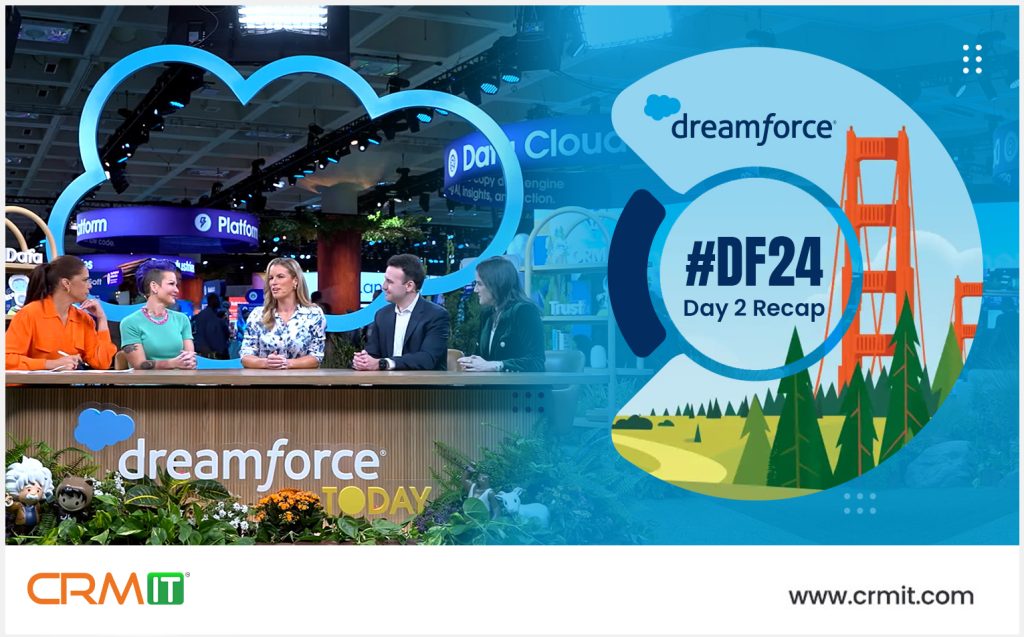Dreamforce 2024 Day 2 Recap: Exploring AI’s Transformative Role

1. Human-Centric AI and the Future of Work
The theme of human-centric AI continued to dominate Dreamforce. Salesforce executives, alongside other industry leaders, emphasized how AI isn’t replacing workers, but rather augmenting human capabilities. Natalie Scardino, Chief Product Officer at Salesforce, discussed how the 120+ AI agents launched by the company aim to empower employees across multiple industries. These agents aren’t designed to remove human workers but to add scale to existing operations.
Mick Costigan of SF Ventures and Denise Dresser of Slack further discussed AI’s role in increasing efficiency. They highlighted how AI can streamline workflows and create new KPIs that focus on output, not just how busy someone looks. These changes help management recognize real productivity gains driven by AI tools.
2. Addressing AI Adoption Challenges
Salesforce continued to prioritize ethical AI development and sustainability efforts, with discussions around AI governance and responsible innovation. Leaders spoke about the need for transparency and fairness in AI deployments, ensuring that businesses prioritize ethics as they accelerate their AI journeys. In line with this, Salesforce reiterated its commitment to achieving net-zero carbon emissions by 2030, showing how technological advancements and environmental stewardship coexist.
One of the most discussed topics was the potential risks posed by AI, including workers “going rogue” by using personal AI accounts at work. Dresser emphasized the importance of clear guidelines, and both Scardino and Kus noted the need for companies to implement responsible AI usage policies.
3. The Evolving Job Market in the Age of AI
A major point of discussion on Day 2 was the impact of AI on the job market, particularly entry-level roles. The panelists were optimistic about the future, highlighting that while AI may automate basic tasks, it will also create new opportunities for upskilling and more specialized roles. Kus expressed how AI could empower young workers to be more effective, while Scardino discussed Salesforce’s investments in educational initiatives to prepare the workforce for this shift.
Dresser added that AI won’t just eliminate jobs but will evolve them, allowing employees to focus on higher-level, creative tasks. With the rise of AI, a focus on continuous learning and adaptation was emphasized as crucial for future career growth.
4. A Deep Dive Into Cybersecurity and AI
A highly anticipated session was Marc Benioff’s conversation with Alejandro Mayorkas, U.S. Secretary of Homeland Security, which focused on the intersection of AI and cybersecurity. Mayorkas highlighted the immense opportunities AI presents for the government but also emphasized the importance of creating a comprehensive framework for AI safety and security. He pointed out that AI’s potential must be harnessed responsibly, and every part of the AI ecosystem—from developers to end-users—needs to be included in this framework.
The conversation also touched on the current political landscape and challenges in governance, particularly around cybersecurity. Benioff and Mayorkas discussed how difficult it can be for tech firms to provide meaningful advice to the government due to political barriers, but emphasized the importance of bridging these gaps.
5. Agentforce: Salesforce’s Next Big Leap
Another major highlight of the day was Salesforce’s Agentforce platform, which promises to transform customer service and operational efficiency using AI agents. Built on the Salesforce platform, Agentforce integrates company data and AI-powered insights to provide tailored solutions across industries. Whether in customer service, healthcare, or online retail, the platform allows businesses to simplify operations, with agents performing tasks automatically or handing them off to human workers when necessary.
Gary Brandeleer, Senior Director of Product Management at Salesforce, demonstrated how Agentforce can reduce complexity in chatbots, decreasing the number of required intents and improving overall efficiency. The platform also uses AI to take action on behalf of users, empowering teams to focus on strategic work while automating routine tasks.
6. Un/wind’24: Post-Dreamforce Gathering with Industry Leaders and Customers
Following the excitement of Dreamforce 2024, CRMIT Solutions hosted their annual customer connect un/wind’24 to bring together industry leaders, customers, and key stakeholders. The event aimed to provide a more relaxed and intimate setting, enabling attendees to unwind after the inspiring and future-focused keynotes & sessions at Dreamforce.un/wind’24 also offered an opportunity for fellow customers to exchange experiences on CRMIT’s game-changing ability to equip their business with autonomous AI agents that not only empower their workforce but also stay ahead with faster and better decision-making. With a blend of great food, ambient music, and curated networking sessions, the event became a perfect blend of business and relaxation.
Conclusion: AI’s Bright Future
As Day 2 of Dreamforce wrapped up, it became clear that AI will continue to shape the future of work. From empowering employees to transforming customer service through Agentforce, Salesforce is leading the charge in making AI a cornerstone of business operations. As the workforce evolves and AI adoption increases, the importance of responsible usage and clear guidelines remains paramount. Dreamforce 2024 has so far delivered a comprehensive view of how businesses can harness AI to drive success, and we’re eager to see what Day 3 brings.
